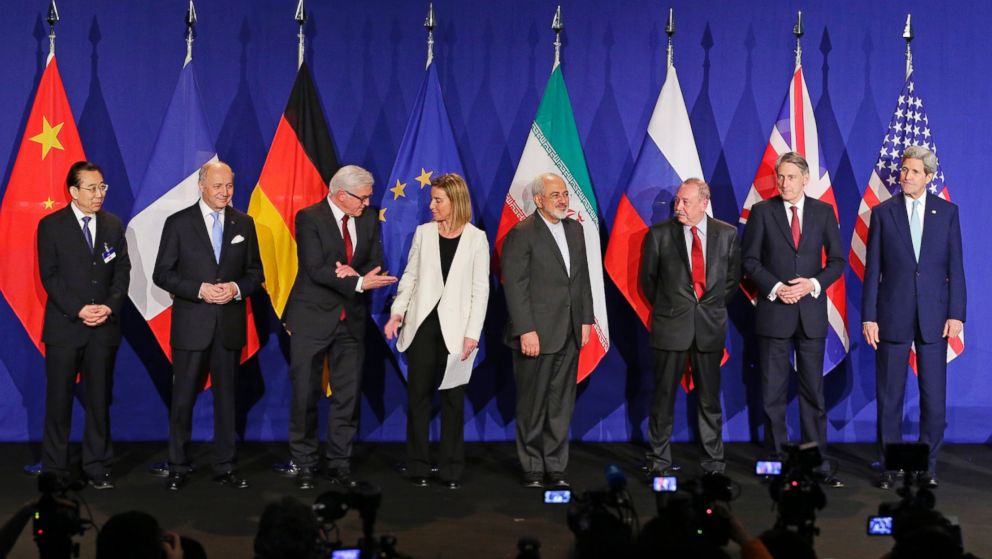The White House said Friday that U.S. President Donald Trump will not certify Iran’s compliance with the 2015 nuclear deal, the Joint Comprehensive Plan of Action, putting the future of the multilateral agreement in the hands of the U.S. Congress.
In a “fact sheet” released by the White House, Mr. Trump said, “It is time for the entire world to join us in demanding that Iran’s government end its pursuit of death and destruction.”
Mr. Trump will decertify Iran’s compliance with the JCPOA and rely on a domestic law called the Iran Nuclear Agreement Review Act. The 2015 legislation gives Congress 60 days to determine whether to reimpose nuclear-related sanctions on Iran.
The president will outline the strategy in a speech later on Friday. He is also expected to announce that he is directing the Treasury Department to identify individuals within Iran’s Islamic Revolutionary Guard Corps or entities connected with it that support terrorist activities.
Speaking to reporters on a press call, Secretary of State Rex Tillerson said, “We have had an interagency process, the president has come to the conclusion that he cannot certify under INARA that the sanctions relief that was provided is proportional to … [the] benefit that we are seeing from that agreement.”
The administration had until October 15 to certify Iran’s compliance with the deal reached between the two nations and the other five permanent members of the U.N. Security Council in July 2015.
In exchange for strict IAEA monitoring, the dismantling of centrifuges and shipping of enriched uranium to Russia, along with other measures, the P5+1 agreed to lift nuclear-related sanctions against Iran. The deal doesn’t cover other U.S., E.U. or U.N. sanctions, such as those against Iran’s ballistics program, which Washington maintains violates a 2010 U.N. Security Council resolution.
The lack of support for decertifying the deal may make Mr. Trump’s move a purely symbolic act, Dr. Sarah Kreps, Associate Professor in Cornell University’s Department of Government, told The Globe Post.
“Decertifying is a way for Trump to be seen as acting on campaign language that impugned the deal as ‘terrible.’ It also fulfills U.S. law (the Iran Nuclear Agreement Review Act), which requires that Congress be given periodical status updates on Iran’s compliance with the agreement,” she said.
The Republican-led Congress passed the INARA in response to fears that the Obama administration would refuse to reinstate sanctions if Tehran violated the deal, but the deal’s critics in the House and Senate may no longer have the support to roll back sanctions.
“Barring that, the status quo prevails, with no change to the agreement. Trump can then blame Congress for having failed to take more aggressive measures against Iran,” Ms. Kreps said.
Mr. Tillerson told reporters that the U.S. wants Europe to apply sanctions against the IRGC. “They indicate they do have those same concerns … We are convinced that none of these new sanctions will in any way bring anyone in violation of their obligations for sanctions relief under the JCPOA,” he said.
It is not certain that Republicans in Congress will vote to approve sanctions. Reuters news agency reported this week that top lawmakers fear the move would alienate European allies. “As flawed as the deal is, I believe we must enforce the hell out of it,” House Foreign Affairs Committee chair Ed Royce said on Wednesday.
If Congress does decide to reapply nuclear-related sanctions, Europe may have trouble abiding by the JCPOA in the short term, said Dr. Jane Boulden, Political Science Professor at the Royal Military College of Canada.
“If the U.S. reimposes sanctions Iran has very little incentive to continue to abide by the terms of the deal, and can accuse the U.S. of acting in bad faith,” Ms. Boulden told The Globe Post.
“If there is some kind of drawn out middle position where the President de-certifies and Congress takes doesn’t make a clear decision, the other parties will likely continue to argue in favor of the existing deal and try to push U.S. decision-makers to stick with the deal and thus go against the President.”
They may not have to push hard: The stance of the U.S. president and Republican members of Congress against the JCPOA are not supported by the rest of the P5+1, or even the majority of the Trump administration.
Earlier this month, Defense Secretary James Mattis told a Senate panel that he believed the nuclear deal was in America’s best interest. Both Secretary of State Rex Tillerson and White House chief of staff (formerly the Homeland Security chief) H.R. McMaster have advised Mr. Trump to recertify Iran’s compliance with the JCPOA.
Dr. Muhammad Sahimi, the N.I.O.C. Chair in Petroleum Engineering and Professor of Chemical Engineering and Materials Science at the University of Southern California, told The Globe Post that France, Germany and the U.K. were unlikely to change their position on the nuclear deal no matter what the U.S. decides.
The EU members of the P5+1 “warned Trump about the dangers and implications of his intentions, and have indicated that they will stay in JCPOA and contain its implementations as well as carrying out their obligations,” he said.
“Aside from the ultra-right government of Israel, every nation and everyone, including Trump’s own national security team support JCPOA and have advocated sticking with it.”
The International Atomic Energy Agency, which has been monitoring and verifying the nuclear deal since it was implemented in January 2016, has affirmed eight times that Tehran is upholding its JCPOA obligations.
Mr. Tillerson acknowledged that, saying the administration does not dispute that Iran is “under technical compliance” with the accord.
Iran is unlikely to walk away from the JCPOA, and Mr. Trump’s move may ultimately put the U.S. at odds with its European allies. French President Emmanuel Macron told CNN last month that he supports the JCPOA, and German Chancellor Angela Merkel and U.K. Prime Minister Theresa May have personally urged Mr. Trump to keep the deal. Ms. May said last week that the U.K. is “firmly committed” to upholding its obligations under the deal.
Ms. Kreps said the other parties to the nuclear deal have no legal basis for escalating at the U.S. since Mr. Trump’s decertification does not itself have any substantive impact on the agreement.
“It would also be incumbent upon members of Congress to quickly signal their interest in preventing the deal from collapsing, since the Iranians know that Trump decertifying kicks agency over to Congress and will be looking to Congress for clues about their next steps,” she said.
At a cabinet meeting on Wednesday, Iranian President Hassan Rouhani said any party that walked away from the accord “would be tarnishing its own reputation.”
Citing European officials, Reuters reported Wednesday that France, Germany and the U.K. are planning to redouble efforts to lobby Congress against reapplying sanctions, as well as releasing statements confirming their own commitments to upholding the deal.
Europe, China and Russia are likely also already reaching out to Tehran behind the scenes in an effort to encourage officials to adhere to the provisions of the JCPOA, Ms. Boulden said.
“The problem for all of them at the moment is uncertainty about the exact nature of the U.S. position so they will be looking at various options to all possible scenarios, but all of them will be geared to the key objective of keeping Iran on the non-nuclear weapons track.”























